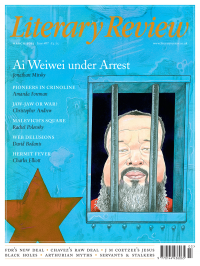Talitha Stevenson
Couch Surfing
The Examined Life: How We Lose and Find Ourselves
By Stephen Grosz
Chatto & Windus 225pp £14.99
During the last fifty years the figure of the psychoanalyst in popular culture has plunged all the way from eminence to stock comedy. It is broadly accepted that humour is a means of expressing anger and fear without risking hostility, and that jokes allow us to regress momentarily into a childlike mode of cognition. So, why all the jokes about shrinks – or, to put it another way, why might we become angry and fearful and wish to opt out of adulthood at the thought of psychoanalysis? So repulsive is the idea of becoming ‘dependent’ on a psychoanalyst (as I once heard it described) that those who aren’t giggling are likely to be googling ‘Cognitive Behavioural Therapy’ and booking a cure-all block of twelve sessions instead.
Given the climate of scepticism, it is striking that an unapologetic, non-satirical book about psychoanalysis has been on the bestseller list for several months. Some have suggested that here, at last, is someone who argues the case for psychoanalysis – but this is projection. Its author, Stephen Grosz, isn’t arguing;

Sign Up to our newsletter
Receive free articles, highlights from the archive, news, details of prizes, and much more.@Lit_Review
Follow Literary Review on Twitter
Twitter Feed
The era of dollar dominance might be coming to an end. But if not the dollar, which currency will be the backbone of the global economic system?
@HowardJDavies weighs up the alternatives.
Howard Davies - Greenbacks Down, First Editions Up
Howard Davies: Greenbacks Down, First Editions Up - Our Dollar, Your Problem: An Insider’s View of Seven Turbulent...
literaryreview.co.uk
Johannes Gutenberg cut corners at every turn when putting together his bible. How, then, did his creation achieve such renown?
@JosephHone_ investigates.
Joseph Hone - Start the Presses!
Joseph Hone: Start the Presses! - Johannes Gutenberg: A Biography in Books by Eric Marshall White
literaryreview.co.uk
Convinced of her own brilliance, Gertrude Stein wished to be ‘as popular as Gilbert and Sullivan’ and laboured tirelessly to ensure that her celebrity would outlive her.
@sophieolive examines the real Stein.
Sophie Oliver - The Once & Future Genius
Sophie Oliver: The Once & Future Genius - Gertrude Stein: An Afterlife by Francesca Wade
literaryreview.co.uk